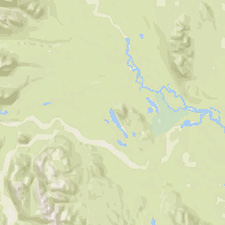Description
The cabin is 12-by-14 feet and equipped with wooden bunks that sleep up to six guests.
Facilities
The cabin is furnished with a table, benches, wood and oil stoves, a rainwater catchment barrel and an outdoor pit toilet.
The cabin does not have running water, electricity, cut firewood or heating oil.
Capacity
6 people
Area
Mile 21, Copper River Highway
Location
Located just off the Copper River Highway in the Chugach National Forest.
Access
Access to the cabin is by motor vehicle. The trailhead to the cabin is located at Mile 21 of the Copper River Highway. The cabin is approximately 80 yards from the road on the McKinley Lake Trail.
Terrain
Although the cabin isn't in the remote wilderness, it makes a good base camp for exploring the Copper River Delta and the surrounding areas. Fishing, hiking, hunting and wildlife viewing are within the vicinity.
Special Features
Approximately 1.25 miles from the McKinley Trail trailhead is the junction for the Pipeline Lakes Trail, which wanders through muskeg meadows and spruce-hemlock forests below steep mountainsides. In the spring, brown bears can be seen grazing on the new grass on the south-facing slopes.
The trail also reaches McKinley Lake and McKinley Lake Cabin, about 2.25 miles from the trailhead. The trail meets the shoreline of the lake at both its southern end, and at the cove at its upper area. Hiking approximately a quarter-mile beyond the cabin, visitors will find remnants of the Lucky Strike Mine. Rusting machinery, pipes and a collapsed tunnel are the most obvious evidence of the mine site.
The closest fishing area to the McKinley Trail Cabin is just across the highway in the upper part of Alaganik Slough. The highway is a two-lane dirt road with anywhere from 10 to 75 vehicles per day. Coho salmon move into the slough with the high tides downstream. In late August and September, they start moving up the slough to the spawning grounds, passing near the cabin. Other coho salmon fishing spots are found in the area as well.
Hunters can take advantage of a long hunting season in the surrounding national forest. Bear season occurs during spring and fall, while deer season begins in late summer and lasts through late fall.
Season of Use
Year-round
Managing Agency
Chugach National Forest
What To Bring
Visitors must bring their own supply of drinking water, firewood and #1 stove oil for the oil stove.
Visitors must bring food, sleeping bags, sleeping pads, a cook stove, matches, cooking gear, lanterns or flashlights, toilet paper, a first aid kit and garbage bags. All trash and food must be packed out, and visitors are expected to clean the cabin before leaving.
Rowboat
No
Stove
Oil & Wood
USGS Topo Map
N/A



